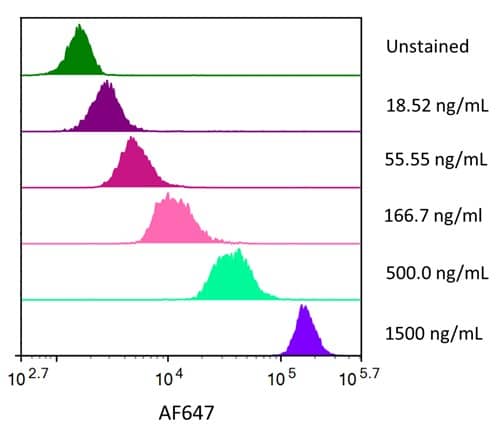Recombinant Human CD19 Fc Chimera Alexa Fluor® 647 Protein Best Seller
R&D Systems, part of Bio-Techne | Catalog # AFR9269

Key Product Details
- R&D Systems CHO-derived Recombinant Human CD19 Fc Chimera Alexa Fluor® 647 Protein (AFR9269)
- Quality control testing to verify active proteins with lot specific assays by in-house scientists
- All R&D Systems proteins are covered with a 100% guarantee
Source
Accession #
Structure / Form
Labeled with Alexa Fluor® 647
Excitation Wavelength: 650 nm
Emission Wavelength: 668 nm
Conjugate
Applications
Product Specifications
Source
| Human CD19 (Glu21-Lys291) Accession # P15391.6 |
IEGRMD | Human IgG1 (Pro100-Lys330) |
| N-terminus | C-terminus |
Purity
Endotoxin Level
N-terminal Sequence Analysis
Predicted Molecular Mass
SDS-PAGE
Activity
Scientific Data Images for Recombinant Human CD19 Fc Chimera Alexa Fluor® 647 Protein
Flow cytometry analysis for Recombinant Human CD19 Fc Chimera Alexa Fluor® 647 staining on anti-Human CD19 Monoclonal Antibody conjugated beads.
Streptavidin coated beads conjugated to biotinylated anti-Human CD19 Monoclonal Antibody were stained with the indicated concentrations of Recombinant Human CD19 Fc Chimera Alexa Fluor® 647 (Catalog # AFR9269).Recombinant Human CD19 Fc Chimera Alexa Fluor® 647 Protein SDS-PAGE.
2 μg/lane of Recombinant Human CD19 Fc Chimera Alexa Fluor® 647 Protein (Catalog # AFR9269) was resolved with SDS-PAGE under reducing (R) and non-reducing (NR) conditions and visualized by Coomassie® Blue staining, showing bands at 77-92 kDa and 150-180 kDa, respectively.Formulation, Preparation and Storage
AFR9269
| Formulation | Supplied as a 0.2 μm filtered solution in PBS with BSA as a carrier protein. |
| Shipping | The product is shipped with dry ice or equivalent. Upon receipt, store it immediately at the temperature recommended below. |
| Stability & Storage | Protect from light. Use a manual defrost freezer and avoid repeated freeze-thaw cycles.
|
Background: CD19
CD19 protein is a 95 kDa transmembrane glycoprotein that plays a central role in B cell activation and humoral immune responses (1, 2). CD19 is expressed throughout B cell development from pre-B cells through mature B cells, and it is commonly used as a B cell lineage marker (1). It is required for the responsiveness of mature B cell to antigen stimulation, germinal center development, and antibody affinity maturation (4, 5). The CD19 protein associates with the B cell antigen receptor (BCR), CD81, CD38, CD21, CD22, and IFITM1/CD225/Leu13, (6-9). These associations enable CD19 to amplify B cell signaling (7, 9-12) and reduce the threshold for antigen stimulation through the BCR (13). CD19 polymorphisms and up-regulation can lead to the development of autoimmunity by promoting autoantibody production (2). CD19 has emerged as promising therapeutic target for hematologic cancers and solid tumors. Immunotherapy using a chimeric antigen receptor (CAR) targeting CD19 has proven effective in many different cancers. The first CD19 CAR T cell therapies have been granted FDA approval for the treatment of B cell malignancies with several more in clinical trials. Mature human CD19 protein consists of a 272 amino acid (aa) extracellular domain (ECD) with two Ig-like domains, a 22 aa transmembrane segment, and a 243 aa cytoplasmic domain (3). Within the ECD, human CD19 shares 57% amino acid sequence identity with mouse and rat CD19.
References
- Wang, K. et al. (2012) Exp. Hematol. Oncol. 1:36.
- Tedder, T.F. et al. (1997) Immunity 6:107.
- Tedder, T.F. and C.M. Isaacs (1989) J. Immunol. 143:712.
- Rickert, R.C. et al. (1995) Nature 376:352.
- Engel, P. et al. (1995) Immunity 3:39.
- Vences-Catalan, F. et al. (2012) J. Immunol. 137:48.
- Deaglio, S. et al. (2007) Blood 109:5390.
- Bradbury, L. et al. (1992) J. Immunol. 149:2841.
- Krop, I. et al. (1996) J. Immunol. 157:48.
- O'Rourke, L.M. et al. (1998) Immunity 8:635.
- Buhl, A.M. et al. (1997) J. Exp. Med. 186:1897.
- Sato, S. et al. (1995) Proc. Natl. Acad. Sci. USA 92:11558.
- Carter, R.H. and D.T. Fearon (1992) Science 256:105.
Alternate Names
Entrez Gene IDs
Gene Symbol
UniProt
Additional CD19 Products
Product Documents for Recombinant Human CD19 Fc Chimera Alexa Fluor® 647 Protein
Product Specific Notices for Recombinant Human CD19 Fc Chimera Alexa Fluor® 647 Protein
This product is provided under an agreement between Life Technologies Corporation and R&D Systems, Inc, and the manufacture, use, sale or import of this product is subject to one or more US patents and corresponding non-US equivalents, owned by Life Technologies Corporation and its affiliates. The purchase of this product conveys to the buyer the non-transferable right to use the purchased amount of the product and components of the product only in research conducted by the buyer (whether the buyer is an academic or for-profit entity). The sale of this product is expressly conditioned on the buyer not using the product or its components (1) in manufacturing; (2) to provide a service, information, or data to an unaffiliated third party for payment; (3) for therapeutic, diagnostic or prophylactic purposes; (4) to resell, sell, or otherwise transfer this product or its components to any third party, or for any other commercial purpose. Life Technologies Corporation will not assert a claim against the buyer of the infringement of the above patents based on the manufacture, use or sale of a commercial product developed in research by the buyer in which this product or its components was employed, provided that neither this product nor any of its components was used in the manufacture of such product. For information on purchasing a license to this product for purposes other than research, contact Life Technologies Corporation, Cell Analysis Business Unit, Business Development, 29851 Willow Creek Road, Eugene, OR 97402, Tel: (541) 465-8300. Fax: (541) 335-0354.
For research use only

